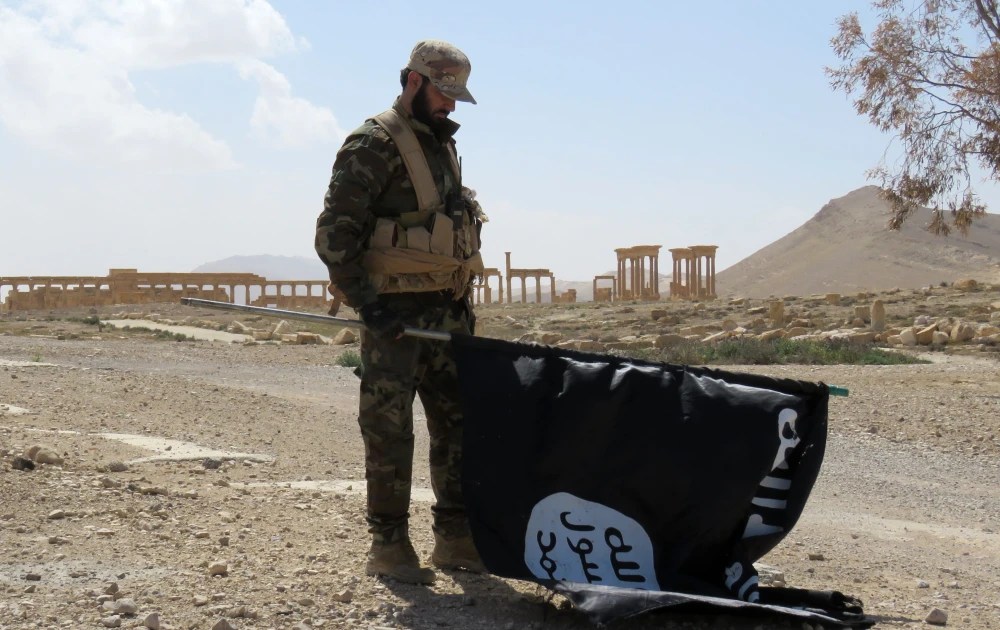An article in the American Foreign Policy magazine stated that the Islamic State is looking to return to the fore, at a time when the West is preoccupied with the current war in Ukraine.
In her article for the magazine, Anshal Vohra - a columnist for the magazine and a freelance television reporter based in Beirut - said that the organization recently called on its supporters to resume attacks in Europe, while the West is paying most attention to the Russian invasion of Ukraine.
In a statement posted on the Internet last week, ISIS spokesman Abu Omar al-Muhajir asked his followers to take advantage of the “Crusaders” fighting each other, to launch an all-out attack to avenge a former leader of the organization who was killed in a raid by US special forces early this year in Northeast Syria.
Al-Muhajir also appealed to ISIS sympathizers in Israel to "arm themselves" against the Israeli entity, claiming that only the return of the Islamic caliphate can liberate the Palestinians.
urgent question
Vohra notes that since the defeat of the Islamic State in 2019 and its defeat from the lands it controlled, analysts have been discussing whether the organization will re-emerge and the consequent major threat.
She continues, saying that talk about the return of the Islamic State became urgent last January, when gunmen affiliated with it stormed a prison in the city of Al-Hasakah, northeastern Syria, to free thousands of its members.
In 2020, ISIS claimed an average of 45 attacks every month in Syria, and it has also grown in strength in Afghanistan and parts of the African continent over the past few years. Last month, "sympathizers" claimed responsibility for two attacks on the cities of Beersheba and Hadera in Israel.
It is true that the ideology of the Islamic State has not faded away, but it seems that it is no longer capable of even lonely attacks, according to the Foreign Policy article, whose writer explains that most of the attacks it recently claimed were carried out by individuals who took upon themselves the burden of jihad without any logistical or material support from anyone.
weakness and decline
And Vohra believes that the re-emergence of the organization again in the West is possible, but there are no indications of that so far. ".
An analysis of the attacks adopted by the Islamic State since its fall reveals that it has become weak and its attempts have declined to be limited to appeals to its sympathizers in the West, although it is not certain that they are still present there.
In any case, the organization no longer had a "physical place" like the one that played a major role in tempting young Muslims living on the margins of Western societies to join it.
Also, ISIS does not control oil wells and does not collect taxes from the local population, as it used to do to manage its affairs and finance its "terrorist" attacks, in the words of the author of the article.
Moreover, the intelligence cooperation between European intelligence services and their counterparts in the Middle East is today - in Fuhra's opinion - stronger than before.
"Simply put, joining the Islamic State is no longer as attractive as it once was to the jihadists in Europe who were eager to belong to it."
The article quotes Olivier Guetta, director general of Global Strat, a risk consultancy, that the Islamic State has not succeeded in carrying out any major attacks in Europe since 2017, considering that "5 years is a very long time for a jihadist organization that used to be in the forefront." The security map and its center.
Gita added that he does not believe that the Western security services are preoccupied with ISIS in the war in Ukraine, and that the war does not affect the organization's ability to carry out "terrorist" attacks in Europe.
The author of the article expresses her belief that the leaders of the “Islamic State” organization are hiding in the last pocket under the control of the rebels of Hay’at Tahrir al-Sham in northeastern Syria, which has disassociated itself from al-Qaeda.
Fohra concludes that the group is trying "without a doubt" to win back the support of Muslims who feel excluded in the West, hoping that potential recruits will carry out their lone attacks.
The writer believes that the only solution to these attacks lies in building “more inclusive and integrated” societies in which different cultures coexist easily, before concluding that according to this understanding, the West should look inside its societies to get rid of the threat of the Islamic State or any other “Islamic jihadist group.” .

